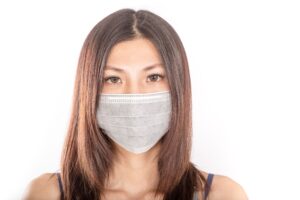
Wearing a mask is one of the best ways you can stay safe while venturing outside. However, wearing a mask for prolonged periods can cause skin problems. Mask-ne, the new term being used for acne caused by wearing a mask, is becoming a problem for many people. It is a sign that it is even more important to manage your skin care during these extraordinary times.
How Does Wearing A Mask Cause Acne?
The type of breakout you may experience when wearing a mask is known as acne mechanica. Acne mechanica occurs when there is too much rubbing and friction on the skin. Friction forms micro-tears and allow acne-causing bacteria to enter.
Masks can also trap oil, humidity, sweat, and dirt. As you breathe, the moisture from your breath gets trapped in the fabric. This environment makes areas like the nose and cheeks covered by a mask to become susceptible to acne.
Furthermore, many of the materials that are used to manufacture masks can irritate and inflame skin. The additional irritation and flaking on the skin surface can also contribute to acne formation.
Stress Can Lead To Breakouts
There is even one more reason why you might be experiencing increased breakouts during this time. Since skin is sensitive to stress, stress can aggravate breakouts. The recent coronavirus pandemic has caused many people to feel stressed. Constantly staying at home during quarantine has made some people feel anxious. Many people are worried about their jobs. Even relationships with family members may be strained. Stress can directly effect the skin and irritate skin conditions like acne.
How To Manage Acne
One of the ways you can avoid getting acne is by washing your face before and after wearing a mask. Use a gentle cleanser to thoroughly wash the skin to get rid of the oil, dirt, and sweat that has been trapped by the mask. Avoid putting on heavy foundation while wearing a mask. Foundation can further trap bacteria in your skin. Use a skin-soothing moisturizer to hydrate the skin and reduce irritation. Consider also lubricating contact points under your mask, like the bridge of your nose and sides of the chin, with an ointment or emollient to decrease rubbing and friction. Choose a mask with a lining that does not irritate the skin and of course, launder your mask frequently to clean dirt and oil out of the fabric.
It can also be beneficial to see a dermatologist to combat acne. Each person’s skin is different, and your dermatologist can provide you with an individualized skin care regimen. For more help with your acne, contact me today!
Previous Post Next Post